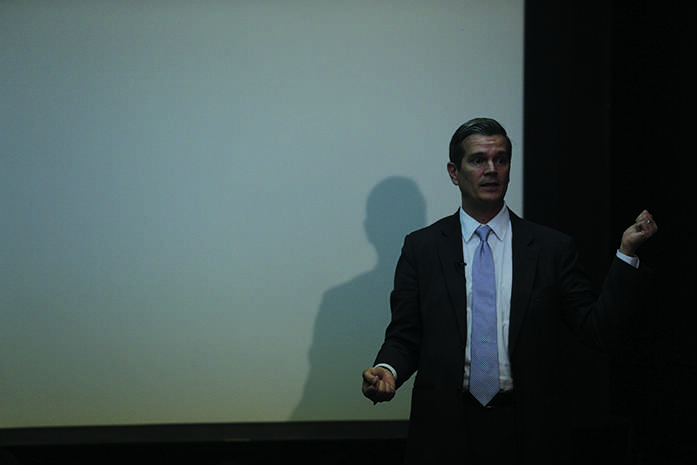By Anis Shakirah Mohd Muslimin
Decades after its origin, the United Nations is still going strong.
Chris Whatley, the executive director of the United Nations Association of the United States, was in Iowa City on Wednesday to celebrate the 70th anniversary of the United Nations. He spoke about the history and accomplishments of the U.N. during an IMU lecture.
“I think it’s just important to reflect on what U.N. Day is for us, the reason it is important for us is because it marks the ratification, the coming into effect of the U.N. Charter,” he said.
The U.N. Charter is an international treaty that sets out basic principles of international relations.
Whatley’s talk was built around three points from the U.N. Charter preamble: scourge of war, equality of rights among nations, and life and larger freedom.
He said a recent poll within the last 48 hours showed 73 percent of Americans supported the U.N.
“It’s a mild support that isn’t necessarily grounded in a full understanding of what the U.N. is and what the U.N. does, so I think it’s helpful to unpack what its true achievements are and what it’s facing right now,” Whatley said.
During his first time in Iowa, Whatley talked about how the U.N. was formed on the basis to prevent and resolve conflict quickly.
“I believe a success of the U.N. is in using the instruments of international laws to reduce international conflict,” he said. “It’s an imperfect story certainly, but I think it’s a positive story.”
Whatley said one of the greatest successes over 70 years of U.N. history is the decolonization effort, during which more nations have joined the organization from when it first started.
“It’s important to realize the accomplishments of the U.N. in terms of providing development and humanitarian response,” he said. “Helping navigate nations that were once colonists into independence, helping navigate countries who choose to transition into democracy from dictatorship.”
Currently, 193 nations are part of the U.N., with a vast majority of them from democratic countries, Whatley said.
He said the key to success for the U.N. in the next 15 years and beyond is for more individuals to connect with the organization’s missions.
Inayat Baloch, the president of the UI U.N. Association, said the event also intended to bring awareness of human-rights issues to students.
“We can learn these extra things and should not take these opportunities for granted. We will learn how to fight these challenges,” Baloch said. “For example, how to fight climate change.”
Dorothy Paul, the general head of the Iowa U.N. chapter, said she feels it is important for Iowans to know more about issues that are happening locally, such as climate change.
“I’m very impressed by his enthusiasm and his knowledge of the U.N. system, and as for his personal background, he has been an internationalist for a long time, and so the fact that he comes to Iowa and shares that with us is fabulous,” she said.



